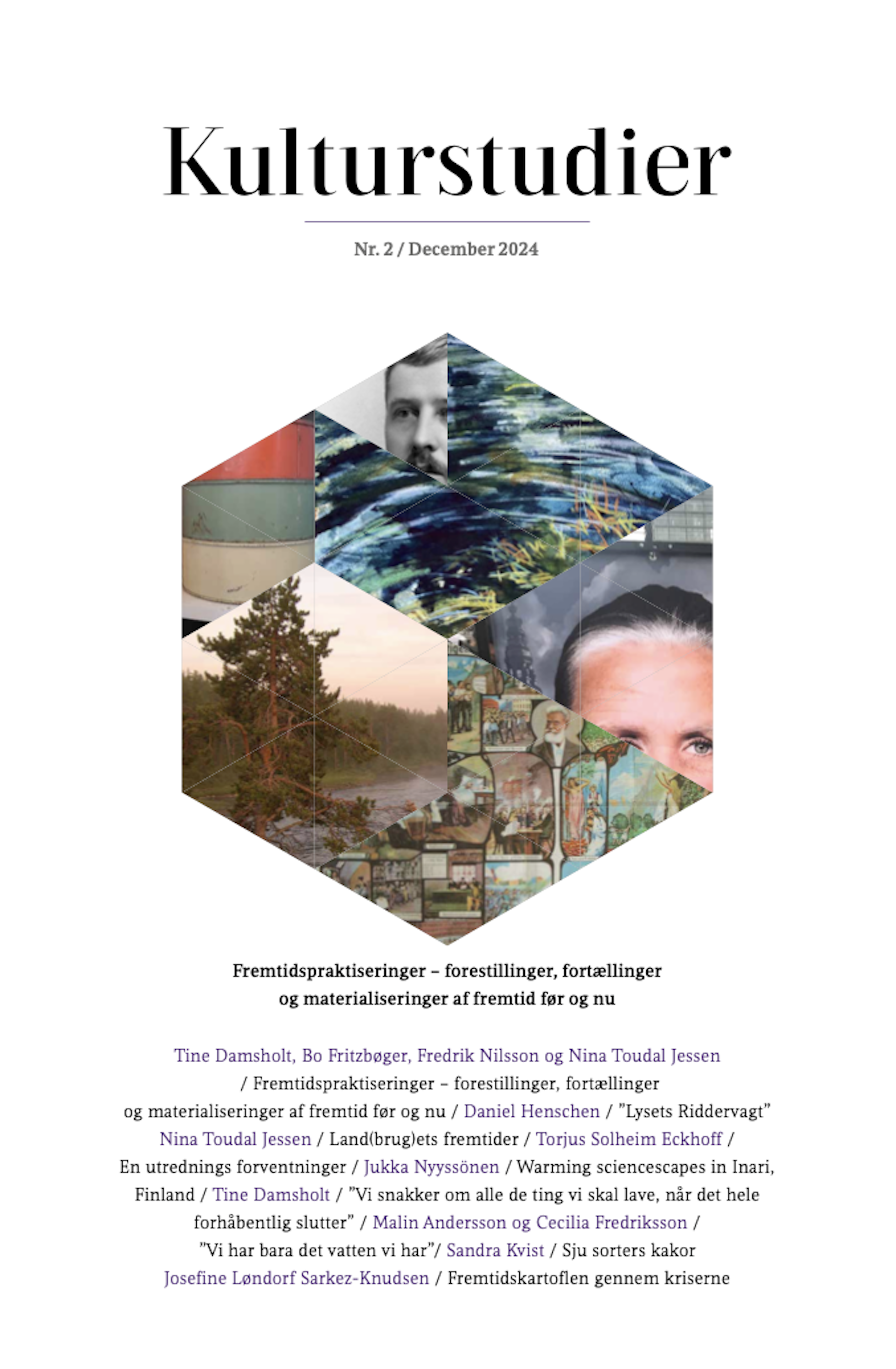"Vi snakker om alle de ting vi skal lave, når det hele forhåbentligt er slut"
Hverdagslivets fremtidspraktiseringer under en krise
DOI:
https://doi.org/10.7146/ks.v14i2.152402Nøgleord:
Fremtidspraktisering, temporalitet, hverdagsliv, mikro-utopi, fremtidsregimerResumé
I hverdagen sameksisterer flere former for fremtid, der må forhandles, og denne artikel belyser nogle af de forskellige måder, hvorpå man engagerer sig i og søger at drage omsorg for en endnu ukendt fremtid, hvad enten den er individuel eller kollektiv i en nærmere eller !ernere tidshorisont. Mere konkret undersøger artiklen, hvordan pandemien som kollektiv samfundskrise dels destabiliserede velkendte måder at planlægge og have forventninger til fremtiden, dels affødte nye affektivt ambivalente artikuleringer af både dystopier og utopier, og dels hvordan frygt og håb for fremtiden kunne omsættes og håndteres i fremtidspraktiseringer i hverdagslivets skala.
Referencer
Ahmed, Sara 2014: “Not in the Mood”. New Formations: A Journal of Culture, Theory, Politics, 82.
Asdal, Kristin 2015: “What is the issue? The transformative capacity of documents”.
Distinktion: Scandinavian Journal of Social Theory, 16:1.
Asplund Ingemark, Camilla 2022: ”Framtidens former. Hur genrer formar
förståelsen av en klimaförändrad framtid i folkloristiska frågelistsvar”. Tidsskrift for kulturforskning, vol. 21, nr. 1.
Balle, Solvej 2020 – 2023: Om udregning af rumfang I – V. Pelagraf.
Barad, Karen 2017: “Troubling Time/s and Ecologies of Nothingness: Re-turning, Re-membering, and Facing the Incalculable.” New Formations: A Journal of Culture, Theory, Politics 92.
Bennett, Jane 2010: Vibrant Matter. A Political Ecology of Things. Duke University press.
Bjærke, Marit Ruge & Kverndokk, Kyrre 2022: Fremtiden er nå: Klimaendringens tider. Scandinavian Academic Press.
Blicher, Nils 1978 (1795): Topographie over Vium Præstekald 1795, Genoptrykt i Blicherselskabets festskri" til Poul Skadhauge. Herning: Blicher-Selskabet, 1978.
Bryant, Rebecca & Knight, Daniel 2019: The Anthropology of Future. Cambridge University Press.
Caruana, Stephanie 2020: ”Kan vi få en ny manuskriptforfatter?” ALT for damerne, nr. 26, juni.
Chakrabarty, Dipesh 2021: ”The cronopolitics of the Anthropocene: The pandemic
and our sense of time”. Contributions to Indian Sociology 55, no. 3.
Coleman, Rebecca 2017: “A sensory sociology of the future: Affect, hope and
inventive Methodologies”. Sociological Review, 65(3).
Cook, Julia Anne 2018: “Hope, Utopia, and Everyday Life: Some Recent Developments.” Utopian Studies, vol. 29, no. 3.
Cooper, Davina 2014: Everyday Utopias. The conceptual Life of Promising Spaces.
Duke University Press.
Dahl Nielsen, Olivia og Bøgh Løkkegaard, Emil 2020: ”Essay på social afstand”. Kristian Engberg (red.): Coronatanker. Studenterperspektiver fra en lockdown.
Forlaget 21.34.
Damsholt, Tine 2020: “Times of Corona. Investigating the Temporalities of Everyday
Life during Lockdown”. Ethnologia Europaea 50 (2).
Damsholt, Tine 2024: “Stopped inside time – re-ordering everyday pandemic
temporalities”. Narrative Cultures, vol.1, no.1.
Davies, Jeremy 2010: “Sustainable nostalgia”. Memory Studies, 3(3).
Delahaye, Ezra 2016: “About chronos and kairos. On Agamben’s interpretation of Pauline temporality through Heidegger”. International Journal of Philosophy and
Theology, 77:3.
Foucault, Michel 2000 (1967/1984): Des espaces autres. Hétérotopies/ Different
spaces. Michel Foucault. Aestetics. Essential Works of Foucault 1954-1984, vol 2.
Penguin.
Goldstein, Diana 2021: “‘Where is global warming when you need it?’: the role of
immediacy in vernacular constructions of climate change”. Kyrre Kverndokk,
Marit Ruge Bjærke og Anne Eriksen (red.): Climate Change Temporalities.
Explorations in Vernacular, Popular, and Scientific Discourse. Routledge, London,
and New York.
Haraway, Donna 2016: Staying with the Trouble. Making Kin in the Chtulucene. Duke
University Press.
Hartog, Francois 2021: “CHRONOS, KAIROS, KRISIS: The Genesis of Western Time”.
History & Theory, 60, no. 3.
Hartog, François 2015: Regimes of historicity: presentism and experiences of time.
New York: Columbia University Press.
Hawkins, Gay 2018: “Plastic and Presentism: The Time of Disposability“. Journal of
Contemporary Archaeology 5.1.
Højrup, Thomas 1995: Omkring Livsformsanalysens udvikling. Museum
Tusculanum.
Jordheim, Helge 2014: “Introduction: Multiple Times and the Work of
Synchronization. History and Theory 53, December.
Jordheim, Helge 2022: “Natural Histories for the Anthropocene: Koselleck’s Theories
and the Possibility of a History of Lifetimes”. History and Theory 61, no.3.
Koselleck, Reinhardt 2004: Futures Past: On the Semantics of Historical Time.
Columbia University Press.
Kverndokk, Kyrre 2020: “Talking about your Generation: “Our Children” as a trope
in Climate Change Discourse”. Ethnologia Europaea, 50 (1).
Levitas, Ruth 2013: Utopia as Method: the imaginary reconstruction of society.
Palgrave Macmillan.
Lowenthal, David 1985: The past is a Foreign Country. Cambridge University Press.
Löfgren, Orvar 2014: “The Black Box of Everyday Life: Entanglements of Stuff,
Affects and Activities”. Cultural Analysis 2014, vol. 13.
Mandich, Giuliana 2020: “Modes of engagement with the future in everyday life.”
Time & Society, vol. 29, Issue 3.
Olsen, Niklas 2012: History in the plural: an introduction to Reinhart Koselleck.
Berghan Books.
Politiken: ”100 ting at glæde sig til”. Tillægget: I byen, 7. april 2020.
Prytz, Lucas Daniel Saenz (2020): ”Uden titel”. Kristian Engberg (red.): Coronatanker.
Studenterperspektiver fra en lockdown. Forlaget 21.34.
Sjögren, Hanna 2020: “Longing for the Past: An analysis of Discursive Formations
in the Greta Thunberg Message”. Culture Unbound. Journal of Current Cultural
Research.
Stjernfelt, Fredrik 2021: ”Last man standing”. Interview med Niels Barfod.
Weekendavisen nr. 16 april 2021.
Websteder:
https://bupl.dk/boern-unge/nyheder/paedagogernes-egne-ideer-50-forslag-til-aktiviteter-udendoers (besøgt august 2024)
#nikoline.werdelin på Instagram (besøgt november 2022)
Downloads
Publiceret
Citation/Eksport
Nummer
Sektion
Licens
Tidsskriftet forbeholder sig ret til førsteudgivelsen, mens ophavsretten til artiklen tilfalder forfatteren.
Artikler udgivet af Kulturstudier licenseret under en Creative Commons Navngivelse-IkkeKommerciel-IngenBearbejdelse 4.0 International Licens





